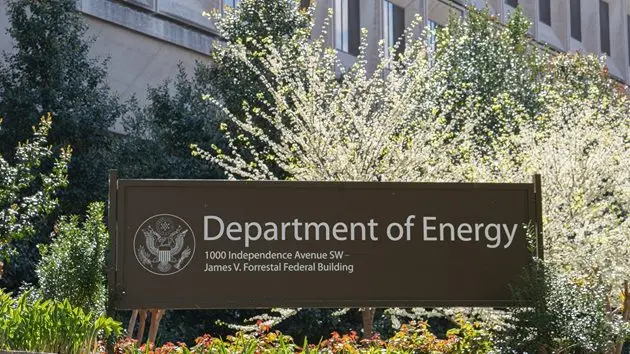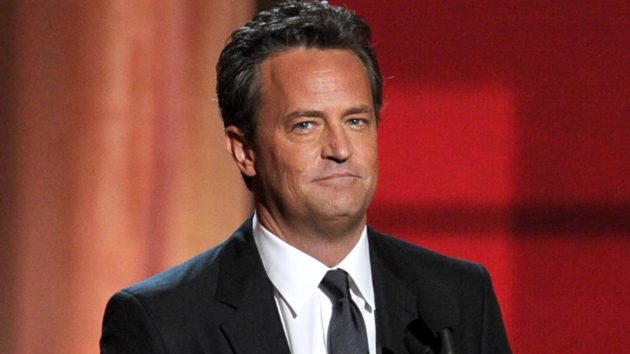(WASHINGTON) — A group of more than 85 climate scientists released a critical review of a recent U.S. Department of Energy (DOE) report on climate change, finding it “biased, full of errors, and not fit to inform policymaking.”
The DOE report, compiled by the agency’s “2025 Climate Working Group,” a five-person panel hand-picked in March by Energy Secretary Chris Wright, was released in late July alongside a proposed regulatory repeal of the Environmental Protection Agency’s “Endangerment Finding.”
In 2009, the EPA issued an Endangerment Finding determining that human-amplified climate change poses a threat to human health and safety, which became the basis for its regulation of greenhouse gas emissions.
“The rise of human flourishing over the past two centuries is a story worth celebrating. Yet we are told, relentlessly, that the very energy systems that enabled this progress now pose an existential threat,” Wright said at the time of the report’s release.
The Climate Working Group, which is at the center of a lawsuit against the Trump administration alleging it was improperly formed, operated without transparency and engaged in unlawful activities, began preparing its findings in early April and compiled the report in about two months.
The conclusions in the report are a stark contrast to well-known climate assessments, such as those from the Intergovernmental Panel on Climate Change (IPCC) and U.S. National Climate Assessment, which include contributions from thousands of scientists around the world and undergo a rigorous years-long process of open and independent review.
The IPCC found that “Human activities, principally through emissions of greenhouse gases, have unequivocally caused global warming.” The U.S. National Climate Assessment determined that “Human activities, principally through emissions of greenhouse gases, have unequivocally caused global warming” and that “without deeper cuts in global net greenhouse emissions and accelerated adaptation efforts, severe climate risks to the United States will continue to grow.”
The release of the DOE report met swift backlash from veteran climate scientists who were critical of the findings, the process and the people selected for the working group. Dozens of members of the climate science community then got together to prepare a detailed, public rebuttal of the DOE report.
“This report makes a mockery of science. It relies on ideas that were rejected long ago, supported by misrepresentations of the body of scientific knowledge, omissions of important facts, arm waving, anecdotes, and confirmation bias. This report makes it clear DOE has no interest in engaging with the scientific community,” Andrew Dessler, a climate researcher at Texas A&M University, who helped organize the effort, said.
Experts involved in reviewing the report said that it includes “biased assessments” and “fundamentally flawed” arguments. They pointed out that the DOE report was produced by a small, hand-picked group, often writing outside their expertise, which led to basic factual errors. The report lacked peer review, was developed in secret, and showed no accountability to public input, these experts said in their review.
According to the rebuttal report, the DOE team “selectively cites outdated or discredited studies” and “misrepresents mainstream sources” of climate science. Reviewers also raised concerns that the report was purposely designed to support a predetermined policy agenda, particularly to undermine the EPA’s Endangerment Finding, rather than to offer an objective scientific assessment.
The DOE report claims that climate models used by scientists overestimate warming trends, that long-term trends for disasters generally don’t show much change and the economic impacts of carbon emissions are “negligible.” The DOE report also said there are advantages to a world with more carbon, like increased plant growth.
“The DOE report is not a neutral scientific assessment, it is a policy-driven document that selectively presents information to support a predetermined narrative. Rather than engaging with the full body of climate science, it highlights isolated findings that, when removed from context, give the misleading impression that rising CO₂ levels are broadly beneficial,” said Becca Neumann, associate professor in the Department of Civil and Environmental Engineering at the University of Washington and head of the hydro-biogeochemistry research group.
In a statement to ABC News, a DOE spokesperson said, “Unlike previous administrations, the Trump administration is committed to engaging in a more thoughtful and science-based conversation about climate change and energy.”
The report was reviewed internally by DOE scientific researchers and policy experts from the Office of Science and National Labs and is open to wider peer review from the scientific community and general public via the public comment period, the DOE spokesperson said.
“The purpose of this report is to restore an open and transparent dialogue around climate science,” the DOE spokesperson concluded. “Following the public comment period, we look forward to reviewing and engaging on substantive comments.”
The benefits from rising carbon dioxide concentrations in the atmosphere are among the key points made in the DOE’s report, emphasizing that higher carbon dioxide levels can enhance photosynthesis and boost crop yields and aren’t necessarily a bad thing. Neumann acknowledges that this effect is real and well-documented, but said it’s already factored into the climate and agricultural models the report seeks to discredit.
“What the report fails to acknowledge is that these benefits are offset by the broader impacts of climate change: rising temperatures, altered rainfall patterns, and more extreme weather—all of which pose serious challenges to agriculture. For most regions in the U.S. and globally, the net effect of climate change on food production is projected to be negative. Yet the report repeatedly suggests the opposite,” said Neumann.
The DOE report not only criticizes numerous climate science findings but also attempts to cast doubt on the reliability of the weather and climate data being collected for analysis, claiming that urbanization effects, like the Urban Heat Island, significantly bias global temperature observations.
However, the scientific consensus, reflected in IPCC assessments, finds that these effects have a minimal to negligible impact on global warming trends. Climate scientists explain that standard data homogenization techniques effectively identify and correct non-climatic biases, and these adjusted datasets are independently validated by rural-only networks and satellite observations.
The critical review, which totals more than 400 pages, was submitted to the Department of Energy during the report’s public comment period.
The DOE report is already facing legal challenges. In August, the Union of Concerned Scientists (UCS) and the Environmental Defense Fund filed a lawsuit in the Federal District Court for the District of Massachusetts, contesting the Trump administration’s use of a secretly convened group to undermine established climate science and regulations. The suit names Secretary Wright, the DOE, EPA Administrator Lee Zeldin, the EPA, and the Climate Working Group as defendants.
The lawsuit cites the Federal Advisory Committee Act, enacted in the aftermath of Nixon-era scandals, which requires that federal government advisory committees operate transparently, make their materials publicly available, and maintain balanced membership.
“Decades of rigorous scientific analysis shows burning fossil fuels is unequivocally contributing to deadly heat waves, accelerating sea level rise, worsening wildfires and floods, increased heavy rainfall, and more intense and damaging storms across the country. We should all relentlessly question who stands to gain from efforts to upend this unassailable and peer-reviewed scientific truth,” Dr. Gretchen Goldman, the president and CEO of UCS, said at the time the lawsuit was filed.
The EPA told ABC News regarding the lawsuit, “As a matter of longstanding practice, EPA does not comment on current or pending litigation.”
Copyright © 2025, ABC Audio. All rights reserved.






